Australia declares that China’s territorial claims over the South China Seas are illegal
China has slammed Australia as ‘reckless’ and intentionally provocative, in response to Australia’s declaration that China’s territorial claims over the South China Seas are illegal.
Behind the Scenes
Don't miss out on the headlines from Behind the Scenes. Followed categories will be added to My News.
- ‘Alarming’: Australia must expose foreign cyber spies
- Huawei infiltrates Australia despite Chinese espionage risks
China has slammed Australia as “reckless” and intentionally provocative in response to Australia’s declaration that China’s territorial claims in the South China Seas are illegal.
And it has claimed that international relations between the two countries are at a “very bad point”, with only a “slim” chance of repair.
The Global Times, widely considered to be the Chinese government mouthpiece, reported that “Australia hasn‘t clearly thought about the consequences” of such claims, in an explosive article titled “Australia unwisely boards US leaky boat”.
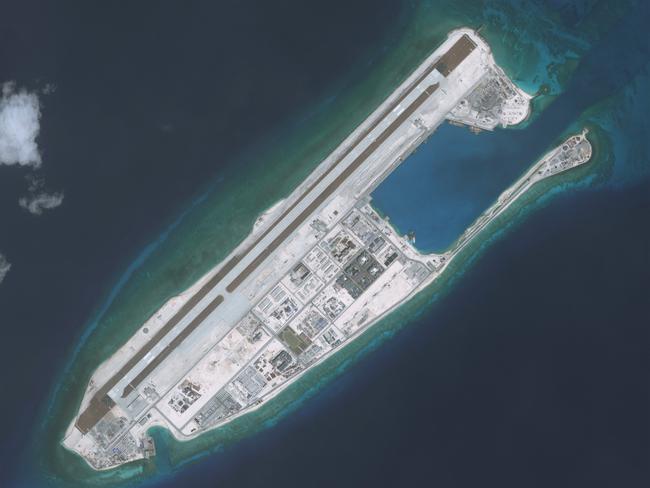
“From China‘s perspective, it’s recklessly making provocations,” the Times said, in an article by Guangdong Research Institute for International Strategies professor Zhou Fangyin, according to The Australian.
The article stated: “The relationship between China and Australia has now deteriorated to a very bad point, and the chance for a turnaround is slim in the near future”.
“One of the main reasons is that Australia‘s policy lacks independence, and its current choice is to closely follow the US lead,” the paper stated.
“If Australia further provokes China, not only on political relations, but also economic relations, the damage to Australia should be expected.
“It should be said that so far, Australia has not learned a great lesson.
It came as Australia escalated tensions with Beijing after it backed a United States move to formally oppose China’s disputed territorial claims in the South China Sea.
According to a declaration filed at the United Nations, Australia has joined America in rejecting Beijing’s claims to the territory as “invalid” under international law, The Australian reports.

The move is certain to further sour diplomatic relations between Australia and China which have plummeted due to the Morrison Government’s stance on an independent inquiry into the source of the COVID-19 pandemic, which began in China’s Wuhan province.
“The Australian Government rejects any claims by China that are inconsistent with the 1982 United Nations Convention on the Law of the Sea (UNCLOS), in particular, maritime claims that do not adhere to its rules on baselines, maritime zones and classification of features,” the declaration reads.
“Australia rejects China’s claim to ‘historic rights’ or ‘maritime rights and interests’ as established in the Tong course ofhistorical practice’ in the South China Sea. The
Tribunal in the 2016 South China Sea Arbitral Award found these claims to be inconsistent with UNCLOS and, to the extent ofthat inconsistency, invalid.
“There is no legal basis for China to draw straight baselines connecting the outermost points of maritime features or ‘island groups’ in the South China Sea, including around the ‘Four Sha’ or ‘continental’ or ‘outlying’ archipelagos. Australia rejects any claims to internal waters, territorial sea, exclusive economic zone and continental shelf based on such straight baselines.”
Canberra has specifically declared China’s claims to the Spratly Islands and the Parcel Islands as invalid.
The islands are part of an ongoing dispute between China, Taiwan, Malaysia, the Philippines, Vietnam and Brunei over ownership.
Earlier this month US Secretary of State Mike Pompeo said China was an “unprecedented threat” to the Pacific region.
Australia is also at odds with Beijing over its tightened grip on Hong Kong with Prime Minister Scott Morrison set to provide a path to citizenship for locals in the territory affected by the recent enactment of a controversial security law by Beijing.
AUSSIE LINKS TO CHINESE ‘SPY’
China ordered the US to close its consulate in the western city of Chengdu, ramping up diplomatic tensions at a time when relations have sunk to their lowest level in decades.
The move was a response to the Trump administration’s order this week for Beijing to close its consulate in Houston after Washington accused Chinese agents of trying to steal medical and other research in Texas.
The Chinese foreign ministry appealed to Washington to reverse its “wrong decision.”
Chinese-US relations have soured amid a mounting array of conflicts including trade, the handling of the coronavirus pandemic, technology, spying accusations, Hong Kong and allegations of abuses against Chinese ethnic Muslims.
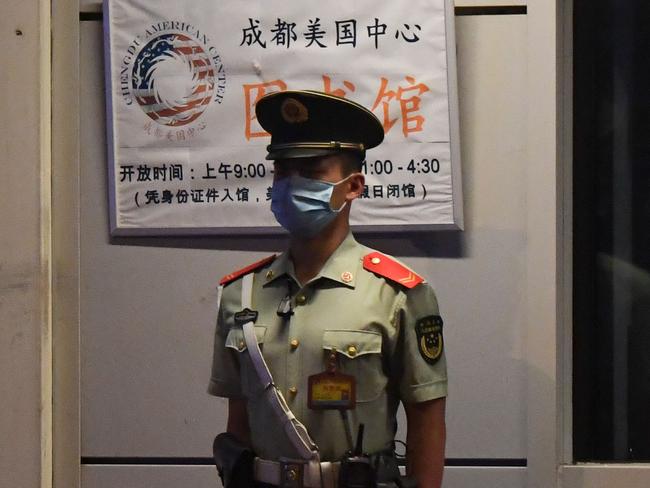
“The measure taken by China is a legitimate and necessary response to the unjustified act by the United States,” said a foreign ministry statement.
“The current situation in Chinese-US relations is not what China desires to see. The United States is responsible for all this.
“We once again urge the United States to immediately retract its wrong decision and create necessary conditions for bringing the bilateral relationship back on track.”
Chinese authorities called on Washington to reverse its decision as it said the closure of the diplomatic office was “breaking down the friendship bridge”.
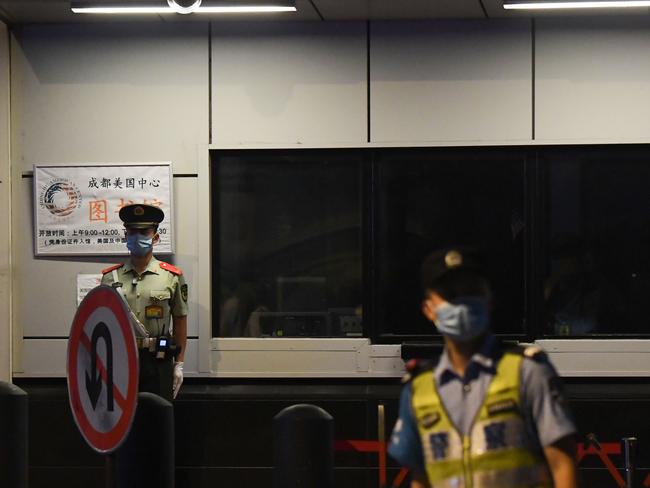
US officials said China was ordered to close the consulate in Houston “to protect American intellectual property” and private information of US citizens.
The order to close was reportedly due to “massive illegal spying and influence operations”.
And in a tit for tat response, China has now ordered the closure of the US consulate in Chengdu – also within 72 hours.
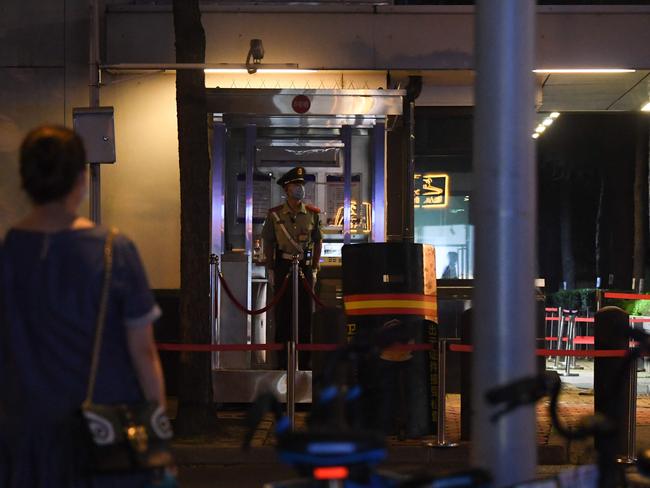
The US has an embassy in Beijing and consulates in Shanghai, Guangzhou, Chengdu, Shenyang, Wuhan and Hong Kong.
Shutting down the diplomatic office comes less than a day after US Secretary of State Mike Pompeo called for “free nations” of the world to help take on China.
“If the free world doesn’t change Communist China, Communist China will change us,” Mr Pompeo said.
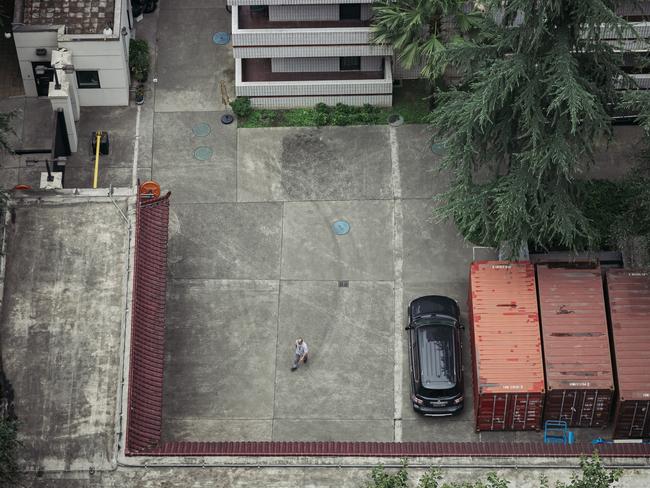
Tensions have been escalating amid the global pandemic for which the Trump administration has repeatedly blamed China, even dubbing the infection the “China Virus”.
Rows have also been raging over China’s claim over ownership of part of the South China Sea, with the US deploying warships to the region in a show of strength.
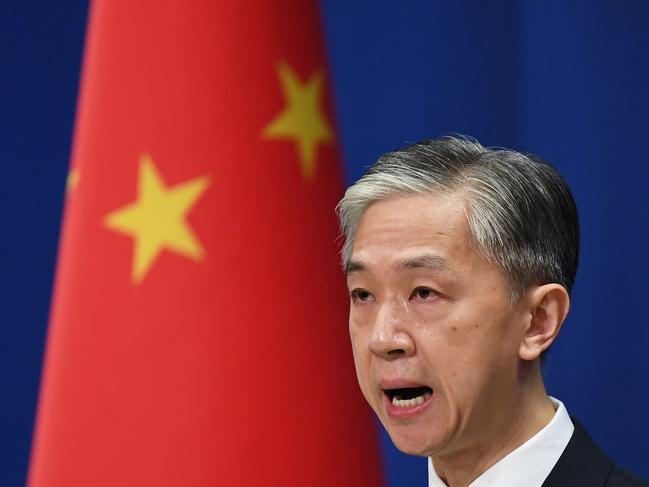
US President Trump has also blasted China over trade as he said signing a deal with the Communist Giant now means “much less to me” because of the pandemic.
Further rows have erupted over Hong Kong, the allegations of abuse over Chinese Muslims, and Chinese technology such as 5G from Huawei – with some fearing the start of a new Cold War.
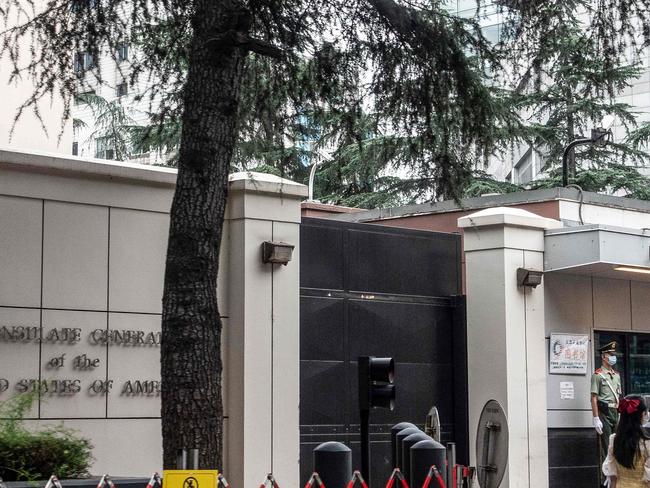
DIPLOMAT ACCUSED OF SPYING ‘HAS LINKS TO AUSTRALIA’
The Chinese diplomat involved in the latest espionage controversy with the United States has spent the last five years in Canberra.
Cai Wei, the Chinese Consul General in Houston who is resisting orders from the US to close the consulate down, was the deputy head of mission in Australia from 2014-2019.
The US abruptly ordered China’s Houston consulate to close last week, accusing it of being a hub of espionage, including involvement in the attempted theft of scientific research.
Hours after the order was made, officials were seen burning documents in barrels in the consulate’s courtyard.
Mr Cai has since indicated China may not obey the order, telling Politico the consulate was still operating as normal, and “we will see what happens tomorrow.’’
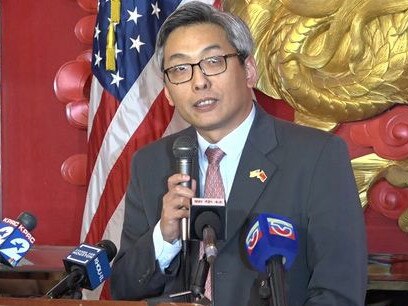
US officials accused the Houston consulate of being involved in “subversive behaviour’’ and alleged Mr Cai and two other diplomats had used fake ID in May to escort Chinese travellers to the gate at George Bush Intercontinental Airport in Houston.
Assistant Secretary of State for the Bureau of East Asian and Pacific Affairs David Stilwell told the New York Times the Houston consulate was at the heart of widespread attempts by China to steal scientific research, which might be related to efforts to develop a vaccine for the coronavirus. The paper also reported several FBI investigations linked to the Houston embassy, relating to alleged attempts to steal medical research, and efforts to influence researchers and others to hand over information to Chinese institutions.
As charge d’affairs or deputy head of mission, Mr Cai was deputy ambassador to Australia before being posted to the US.
He was previously posted to another of the Five Eyes intelligence partner countries, Canada, with a posting in Ottawa.
In 2018, the ABC revealed Mr Cai and other diplomats invited around a dozen new Labor MPs to dinner, where they reassured them that Beijing was not seeking to bully foreign students.
Press releases posted on the embassy’s website show Mr Cai was involved in the usual round of diplomatic activities, visiting Australian states and territories, and hosting networking dinners.
BIOLOGIST ‘LIED ABOUT MILITARY PAST’
Meanwhile, Chinese scientist Juan Tang, suspected of concealing ties to the military, has fled the Beijing’s consulate in San Fransico.
Tang was reportedly hiding in the Chinese consulate in San Francisco after lying about her connections to her country’s military so that she could obtain a visa to enter the US.
Tang Juan, a researcher at the University of California, stated on her visa application that she “had never served in the military”, according to court documents filed by the FBI – which believes she is just one of many Chinese scientists in the US with links to the People’s Liberation Army.
“But open source investigation revealed photographs of her in the uniform of the Civilian Cadre of the PLA (People’s Liberation Army).”
Juan had also worked as a researcher at the air force Military Medical University, also known as FMMU (Fourth Military Medical University), a PLA-affiliated training school for military medical workers, the FBI claimed.
Fox News obtained a copy of the filing, which detailed several other instances when Chinese nationals allegedly lied about their military links on their US visa applications.

Tang denied her military connections in interviews with the FBI – before making the remarkable claim that she only wore a military uniform to school because it was required for attendance.
But the FBI said it found even more evidence of her links to the People’s Liberation Army when they raided Tang’s home in California.
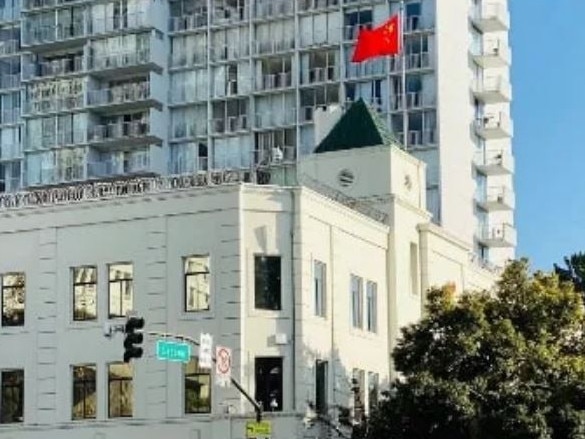
At least one case “of a military scientist copying or stealing information from American institutions at the direction of military superiors in China,” the FBI claimed.
The court documents contained similar evidence against other Chinese scientists, prompting the agency to believe that Tang’s case was part of a larger program run by the PLA, or China’s armed forces.
‘CLEAR EXPECTATIONS’: POMPEO
The FBI’s report comes as President Donald Trump ordered the Chinese consulate to close in Texas following reports of spying and espionage.
US Secretary of State Mike Pompeo addressed the closure of the Houston branch, saying that President Trump said to him: “Enough, we’re not going to allow this to continue to happen.”
“We are setting out clear expectations for how the Chinese Communist Party is going to behave,” Mr Pompeo said.
“And when they don’t, we’re going to take actions that protect the American people, protect our national security, and also protect our economy and jobs.”
Dramatic footage showed fire trucks outside the consulate in Houston as workers burned top secret files following the US order to shut down.
The US only gave the Chinese consulate in Houston 72 hours to close.
The order to close was reportedly due to “massive illegal spying and influence operations.”
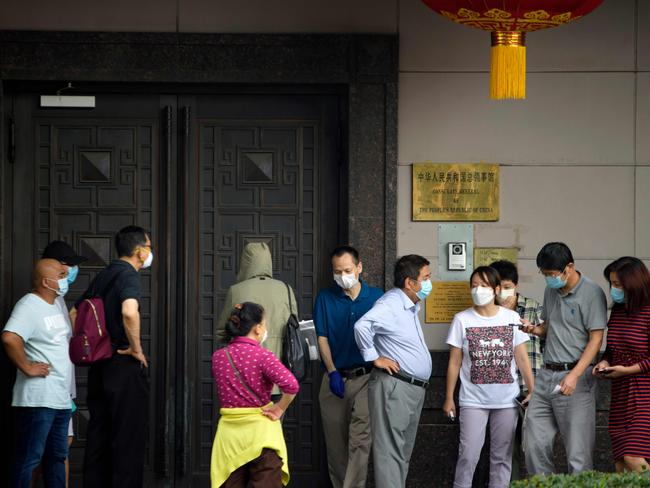
CHINA AND US ‘RACE TO MARS’
China has launched a Mars rocket which informally signalled the start of a space race with the US to land humans on the Red Planet.
The Tianwen-1 was sent up on a Long March-5 carrier rocket from a launch site on Hainan Island.
It marked the second flight to Mars this week, after a United Arab Emirates orbiter blasted off on a rocket from Japan on Monday.
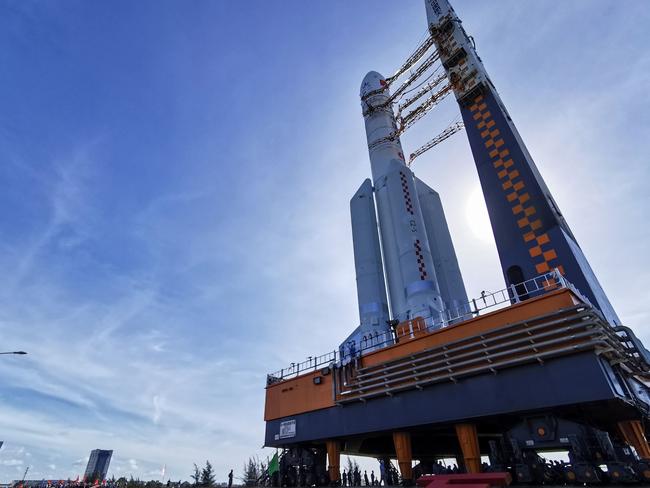
America is also aiming to launch Perseverance, its most sophisticated Mars rover ever, from Cape Canaveral, Florida, next week.
China’s tandem spacecraft — with both an orbiter and a rover — will take seven months to reach Mars, like the others.
If all goes well, Tianwen-1, or “quest for heavenly truth,” will look for underground water, if it’s present, as well as evidence of possible ancient life.
Livestreams showed a successful lift-off, with rockets blazing orange and the spacecraft heading upward across clear blue skies.
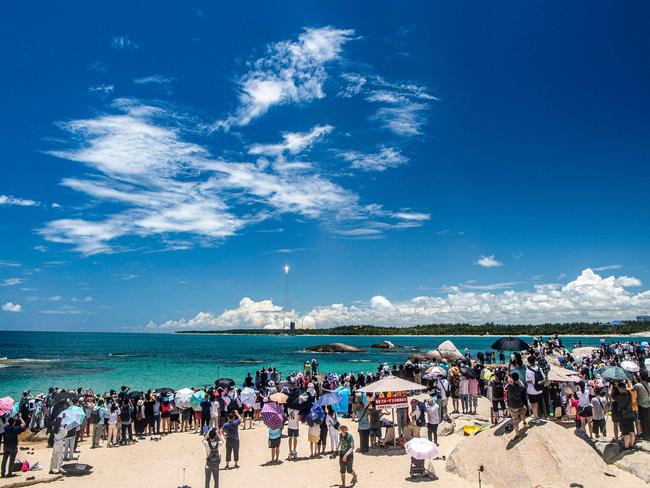
Hundreds of space enthusiasts cried out excitedly on a beach across the bay from the launch site.
Mission chief engineer Wan Weixing said Tianwen-1 would slip into orbit around Mars in February and look for a landing site on Utopia Planitia, a plain where NASA has detected possible evidence of underground ice.
The landing would then be attempted in April or May, according to the article.
If all goes well, the 240-kilogram golf cart-sized, solar-powered rover is expected to operate for about three months and the orbiter for two years.
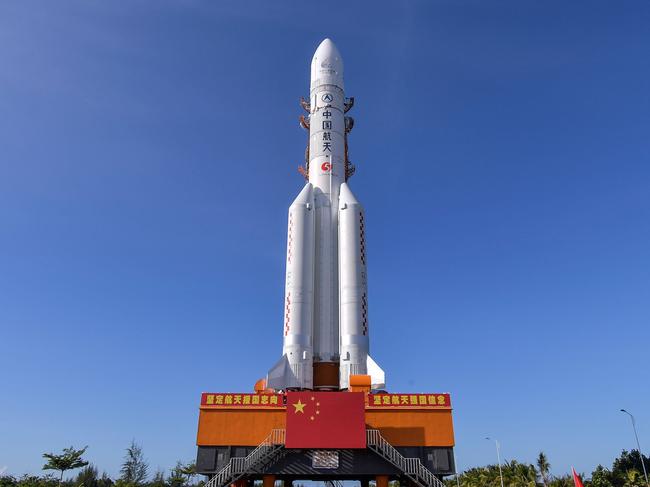
This isn’t China’s first attempt at reaching the Red Planet.
In 2011, a Chinese orbiter accompanying a Russian mission was lost when the spacecraft failed to get out of Earth’s orbit after launching from Kazakhstan, eventually burning up in the atmosphere.
This time, China is going at it alone. It also is fast-tracking, launching an orbiter and rover on the same mission instead of stringing them out.
China’s secretive space program has developed rapidly in recent decades.
Yang Liwei became the first Chinese astronaut in 2003, and last year, Change-4 became the first spacecraft from any country to land on the far side of the moon.
CHINA BLAMED FOR ‘GHOST BOATS’
Japan has blamed China for hundreds of “ghost boats” washing up on their shore – including some which contained skeletons.
Almost 600 of the ghost vessels have been found in the last five years, and 150 in the last year alone.
One of the most grim discoveries came in December 2019 when officials found the heads of two people and the partially-skeletonised bodies of five as a wooded ship floated to Japan’s Sado island.
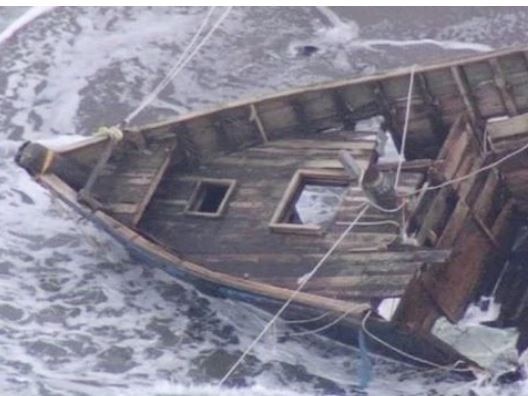
A new investigation by NBC News and Global Fishing Watch (GFW) has compiled the data and collected startling anecdotes.
This includes the story of one Japanese coastguard who says more than 50 North Koreans have washed up on beaches in the past two years.
The reason for the “ghost boats” is China has sent a previously invisible armada of industrial boats to illegally fish in North Korean waters, researchers claim.
This caused desperate North Korean fishermen to risk their lives by going further out to sea in unsafe boats, which became overwhelmed by the harsh waves and swept away.
The Kim Jong-un regime is believed to have put more pressure on the fishermen amid food shortages.
In fact so many fisherman have now disappeared at sea that some port towns are called “widows’ villages”.
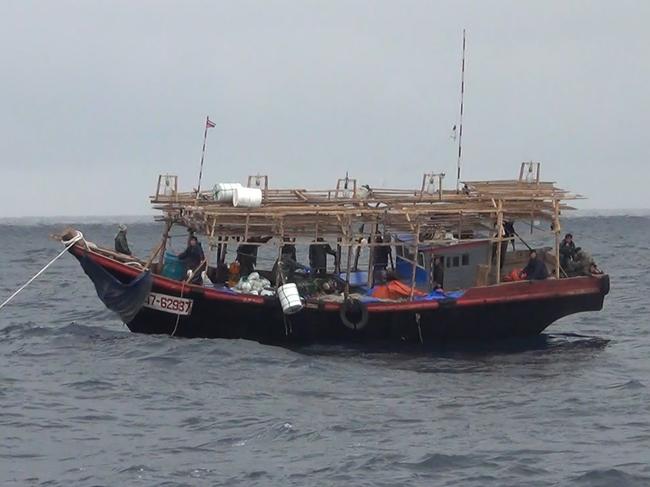
At least 50 survivors have been rescued and interviewed in the last seven years by Japanese authorities, but they have reportedly refused to answer most questions and demanded to be returned to the secretive country of North Korea.
The “dark fleets” of Chinese ships do not publicly broadcast their location or appear in public monitoring systems, according to the Guardian.
For a long time, the ghost ships containing corpses or skeletons in fishing grounds in the Sea of Japan was a mystery.
It was originally believed that climate change had forced squid from their natural location, forcing North Koreans to go further at sea and become stranded until they died from dehydration or starvation.
Many boats that washed up on shore had no-one on board, leaving Japan suspicious that they were carrying spies or even people who travelled there to spread a disease.
GFW are a non-profit organisation campaigning for transparency in the fishing industry.
They said more than 900 Chinese vessels fished illegally in the region in 2017, and 700 in 2018.
The group also believe China likely breached UN sanctions that prohibit foreign fishing in North Korea’s territorial waters.
US ORDERS ‘EVIL’ CHINA TO SHUT CONSULATE
US Secretary of State Mike Pompeo has branded the Chinese Communist Party “evil” as tensions continue to rise after China was ordered to shut its consulate in Houston, Texas.
“Confronting evil is hard. It requires communicating to your people. There are real costs on the nations that confront it,” Pompeo told The Sun on Tuesday.
Pompeo is currently in Europe, where he has been rallying leaders to take a tougher stance with Beijing, and warning governments of the data-harvesting risks associated with using social media apps like TikTok, which is owned by Beijing tech firm ByteDance.
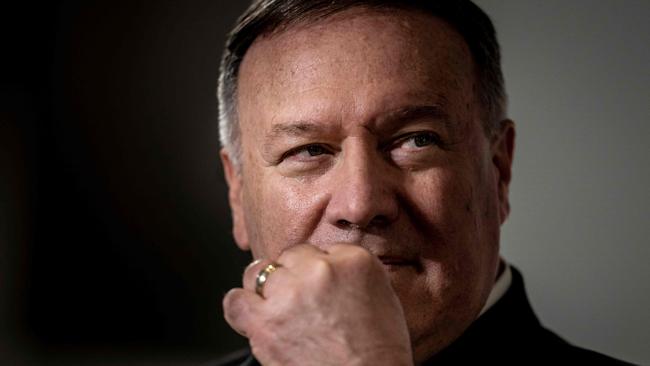
“It is not possible to have your personal information flow across a Chinese server without the rest of that information ending up in the hands of the Chinese Communist Party,” Pompeo said, adding that using apps like TikTok made it inevitable that personal data “will end up in the hands of the Chinese Communist Party.
“This is not about any particular company, it is about the obligation to protect the data of American citizens,” Pompeo said.
The US government is currently considering banning TikTok, which has approximately 800 million users worldwide, over 37 million of which are in the United States.
Defence Secretary Mark Esper issued similar warnings on Tuesday, telling the International Institute for Strategic Studies in London that the United States government has begun preparing its defence forces for possible conflict with China in the Indo-Pacific region and is modernising its “strength deterrence” after the CCP “bullied ASEAN nations out of an established $US2.6 trillion in potential offshore oil and gas revenue.”
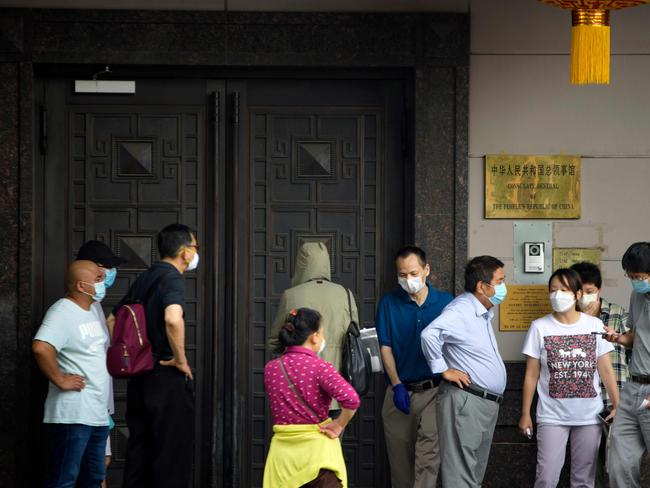
Esper told the Institute, “if we are not careful we will find ourselves in a situation where … we have a completely different regional order that puts China at the top and is based on Chinese values.”
Esper added, “don’t think those are things that any of us want to see happen in the long run.”
The comments from Pompeo and Esper come days after the staff at a Chinese consulate in Texas were seen burning secret documents on the grounds of the property after the US ordered Beijing to close it down.
US ORDERS CHINA TO SHUT TEXAS CONSULATE
The US has ordered China to close its consulate in Houston in what an official in Beijing blasted as an outrageous and unjustified move – leading the country to consider shuttering the American diplomatic office in Wuhan.
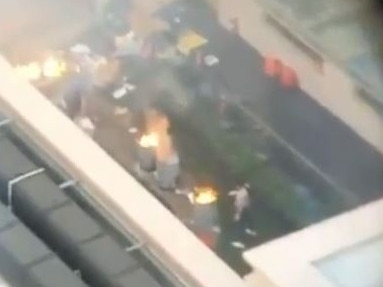
#China consulate was a spy shop pic.twitter.com/UdRlmh7kVc
— Marco Rubio (@marcorubio) July 22, 2020
The State Department claimed the immediate action was needed to “protect American intellectual property” and other private information of American citizens.
Republican Senator Marco Rubio, the acting chairman of the Senate Intelligence Committee, claimed in a tweet Wednesday morning that “China’s Houston consulate is a massive spy centre, forcing it to close is long overdue”.
“We have directed the closure of PRC Consulate General Houston, in order to protect American intellectual property and American’s private information,” US State Department spokeswoman Morgan Ortagus said.
Ms Ortagus added that Washington would not tolerate Chinese violations of their “sovereignty and intimidation of our people, just as we have not tolerated the PRC’s unfair trade practices, theft of American jobs, and other egregious behaviour.”
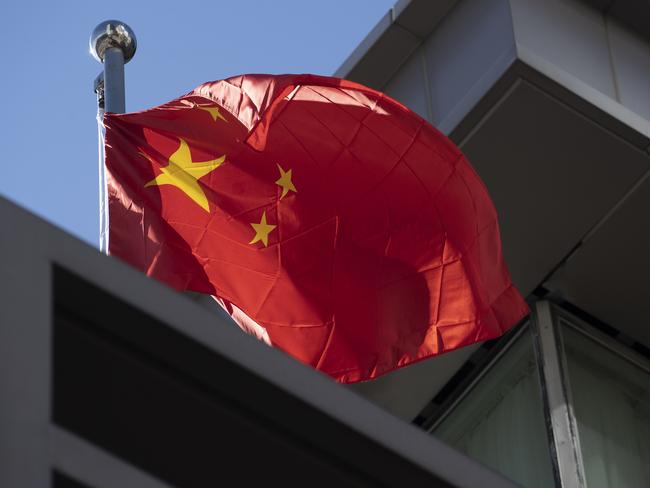
Meanwhile, China hit back with claims that its embassy in Washington DC had been hit with bomb and death threats.
Beijing said the closure was “an unprecedented escalation” and said it would retaliate if Washington did not reverse the decision, Reuters reported.
“China urges the US to immediately withdraw its wrong decision, or China will definitely take a proper and necessary response,” Chinese Foreign Ministry spokesman Wang Wenbin said.

The US government has been harassing Chinese diplomatic staff for some time, Wang added, as well as “intimidating and interrogating Chinese students and confiscating their personal electrical devices, even detaining them,” according to Reuters.
The move — which the Chinese official said will sabotage relations between the two powers — came hours after firefighters responded to a fire reportedly sparked by the burning of documents at the Consulate General of China in Houston.
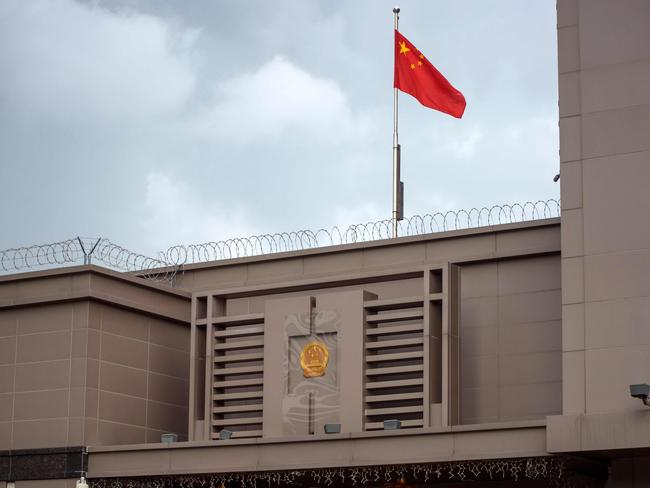
Relations between the two countries have frayed on a number of fronts, running the gamut from trade to Beijing’s handling of the coronavirus pandemic and its policies in Hong Kong, Xinjiang and the South China Sea.
On Tuesday, US prosecutors charged two Chinese nationals in a decade-long cyber espionage campaign in which they allegedly stole information on weapons designs, drug information, software source code and personal data.
The order to shutter the Chinese consulate comes as Secretary of State Mike Pompeo is in Europe, where he has been rallying leaders to take a tougher stance with Beijing, and meeting with exiled dissidents, CNN reported.
The Chinese consulate in Houston was opened in 1979 — the first in the year the US and the People’s Republic of China established diplomatic ties, according to Agence France-Presse.
Besides its embassy in Beijing, the US has five consulates in mainland China — Shanghai, Guangzhou, Chengdu, Wuhan and Shenyang.
CHINA-BACKED HACKERS TARGETED AUSSIE FIRMS
Chinese government-backed hackers targeted an Australian solar company and defence contractor, according to the FBI, which has issued warrants for the pair.
The two Chinese nationals were indicted by the US Justice Department on Tuesday, local time, for a wide range of offences including trying to steal COVID-19 vaccine research from countries around the world.
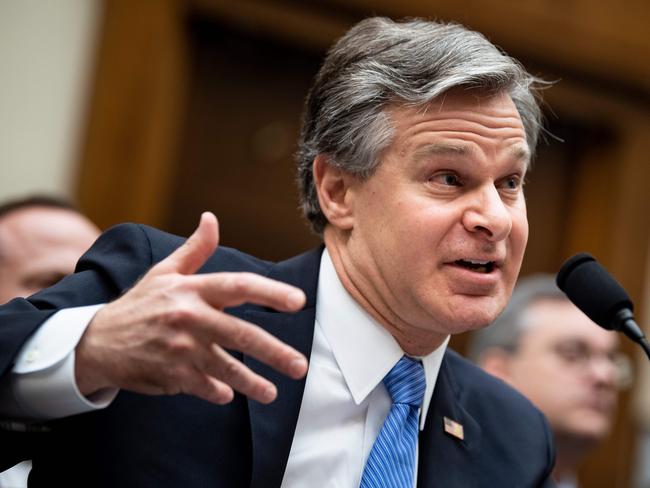
Their targets included “hundreds of victim companies, governments, non-governmental organisations, and individual dissidents, clergy, and democratic and human rights activists in the United States and abroad, including Hong Kong and China”, said the Justice Department.
Li Xiaoyu, 34, and Dong Jiazhi, 33, were “on call” for the Chinese government’s Ministry of State Security, said US Assistant Attorney-General John Demers.
The FBI issued wanted notices for the duo, who are believed to be in China.
They were described as electrical engineers who met at a university in Chengdu, China, and operated their criminal enterprise for more than a decade.
The Australian companies targeted were not identified, apart from being named as Victim 21 and 23.
Demers said the 27-page federal grand jury indictment charged them with targeting a series of companies across the world.
“The hackers targeted technology companies in countries with high technology industries, including in Australia, Belgium, Germany, Japan, Lithuania, the Netherlands, Spain, South Korea, Sweden, the United Kingdom, and the United States,” he said.
“These intrusions are yet another example of China’s brazen willingness to engage in theft through computer intrusions contrary to their international commitments.”
The hacks were attempted through malware, and Australia was targeted in January and April this year.
“On or about January 28, 2020, Li accessed Victim 23’s network via a China Chopper web shell,” the indictment reads.
“Li then executed commands on Victim 23’s network that enabled him to view reconnaissance information such as directory contents and user privileges.”
The hackers acted in some instances “for their own personal gain” and in others for the benefit of the Chinese government.
“The indictment specifically outlines how stealing intellectual property from companies in these hi-tech industries could help Chinese companies replicate the targeted technology and eventually edge out their non-Chinese competitors,” said Demers.
MORE NEWS
Huawei infiltrates Australia despite Chinese espionage risks
Aussie mum nabbing cyber crims taking your cash
Chinese espionage: ‘They’ve targeted Australia’
“China’s anti-competitive behaviour and flagrant disregard for their promises not to engage in cyber-enabled intellectual property theft is not just a domestic issue; it is a global issue.
“The indictment alleges activity against companies in at least 10 countries around the world.
The indictment shows very clearly that no country is immune. Any country with a successful company or industry must be on guard and prepared to protect itself.
“The indictment also highlights how the Chinese government is willing to turn a blind eye to prolific criminal hackers operating within China’s borders.
“In this manner, China has now taken its place, alongside Russia, Iran, and North Korea, in that shameful club of nations that provide a safe haven for cyber criminals in exchange for those criminals being “on call” to work for the benefit of the state, here to feed the Chinese Communist Party’s insatiable hunger for American and other non-Chinese companies’ hard-earned intellectual property, including COVID-19 research.
“With the top cover provided by state officials, these criminals are given free rein to victimise law abiding citizens around the world. All of these activities – state-sponsored theft of intellectual property and knowingly providing a safe havens for cyber criminals – run afoul of norms of acceptable state behaviour in cyberspace, which the international community must address.”
Originally published as Australia declares that China’s territorial claims over the South China Seas are illegal
